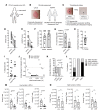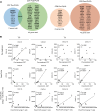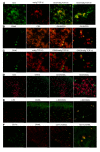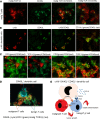Benign T cells drive clinical skin inflammation in cutaneous T cell lymphoma
- PMID: 30626755
- PMCID: PMC6485670
- DOI: 10.1172/jci.insight.124233
Benign T cells drive clinical skin inflammation in cutaneous T cell lymphoma
Abstract
Psoralen plus UVA (PUVA) is an effective therapy for mycosis fungoides (MF), the skin-limited variant of cutaneous T cell lymphoma (CTCL). In low-burden patients, PUVA reduced or eradicated malignant T cells and induced clonal expansion of CD8+ T cells associated with malignant T cell depletion. High-burden patients appeared to clinically improve but large numbers of malignant T cells persisted in skin. Clinical improvement was linked to turnover of benign T cell clones but not to malignant T cell reduction. Benign T cells were associated with the Th2-recruiting chemokine CCL18 before therapy and with the Th1-recruiting chemokines CXCL9, CXCL10, and CXCL11 after therapy, suggesting a switch from Th2 to Th1. Inflammation was correlated with OX40L and CD40L gene expression; immunostaining localized these receptors to CCL18-expressing c-Kit+ dendritic cells that clustered together with CD40+OX40+ benign and CD40+CD40L+ malignant T cells, creating a proinflammatory synapse in skin. Our data suggest that visible inflammation in CTCL results from the recruitment and activation of benign T cells by c-Kit+OX40L+CD40L+ dendritic cells and that this activation may provide tumorigenic signals. Targeting c-Kit, OX40, and CD40 signaling may be novel therapeutic avenues for the treatment of MF.
Keywords: Dermatology; Immunology; Lymphomas.
Conflict of interest statement
Figures








References
-
- Kim YH, Liu HL, Mraz-Gernhard S, Varghese A, Hoppe RT. Long-term outcome of 525 patients with mycosis fungoides and Sezary syndrome: clinical prognostic factors and risk for disease progression. Arch Dermatol. 2003;139(7):857–866. - PubMed
-
- Honig B, Morison WL, Karp D. Photochemotherapy beyond psoriasis. J Am Acad Dermatol. 1994;31(5 Pt 1):775–790. - PubMed
Grants and funding
LinkOut - more resources
Full Text Sources
Other Literature Sources
Molecular Biology Databases
Research Materials

